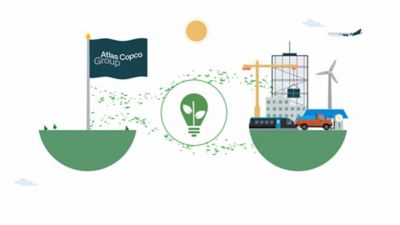Group targets
At Atlas Copco Group, we are committed to being part of the solution for a better tomorrow. This means innovating with a long-term perspective to empower our customers to drive society forward. It means minimizing the environmental impact from our operations and products. It means making sure our employees are safe and healthy and that our company stays lean and efficient. We also want to live up to the highest ethical standards, with zero tolerance for corruption throughout the value chain.
To deliver lasting value for all stakeholders, we focus on the following areas for sustainability: people, ethics, safety and well-being, climate and environment, and products and service. We regard these areas, along with profitability and growth, as necessary to achieve long-term success. Progress in relation to the targets set in these areas is part of the variable compensation for the Executive Management as well as other employees.
Fully committed to being part of the solution for a better tomorrow, we have set science-based targets to reduce greenhouse gas emissions in line with the goals of the Paris Agreement. Please see the first two targets within the climate and environment area below.
Overview of the Group's targets
Financial targets
- Revenue growth measured over a business cycle should be 8%.
- Sustained high return on capital employed by constantly striving for operational excellence and generating growth.
- Earnings as dividends to shareholders should be about 50%.
People targets
- 30% female employees by 2030.
- Employees agree that they feel a sense of belonging in the company – above the global benchmark provided by the employee survey supplier and a continuous increase.
- Employees agree we have a work culture of respect, fairness and openness – above the global benchmark provided by the employee survey supplier and a continuous increase.
- Employees agree there is opportunity to learn and grow in the company – above the global benchmark provided by the employee survey supplier and a continuous increase.
Ethics targets
- 100% of employees have signed the Group’s Code of Conduct compliance statement annually.
- 100% of new employees have participated in the Group’s ethics training within 12 months of joining the company.
- 100% of employees have participated in the Group’s ethics training every other year, starting 2023.
- 100% of significant suppliers have confirmed compliance with the Group’s Code of Conduct.
- 100% of significant distributors have confirmed compliance with the Group’s Code of Conduct.
Safety and well-being targets
- Employees agree that the company takes a genuine interest in their well-being. The rating in the employee survey should continuously increase.
- A balanced safety pyramid, with more reports of risk observations than near misses, more reports of near misses than minor injuries and more or equal reports of minor injuries relative to recordable injuries.
Climate and environment targets
- To keep the global temperature increase to maximum 1.5 degrees, -46% in the CO2e* emissions (tonnes) from scopes 1 & 2 by 2030, compared to the 2019 baseline.
- To keep the global temperature increase well below 2 degrees, -28% in the CO2e* emissions (tonnes) from scope 3 by 2030, compared to the 2019 baseline.
- Continuous increase in the % significant direct suppliers with an approved environmental management system.
- Continuous year-on-year reduction in water consumption in relation to cost of sales.
- 100% reused, recycled or recovered waste from internal operations by 2030.
Products and service targets
- 100% of projects for new and redesigned products have targets for reduced carbon impact.
- By 2024, the Atlas Copco Group has a Group-common methodology for assessing the circularity of new or redesigned products.
* CO2 refers to carbon dioxide, and CO2e stands for "carbon dioxide equivalent", which includes CO2 and other greenhouse gases. An equivalent is a measure of how much a gas contributes to global warming, relative to carbon dioxide.







